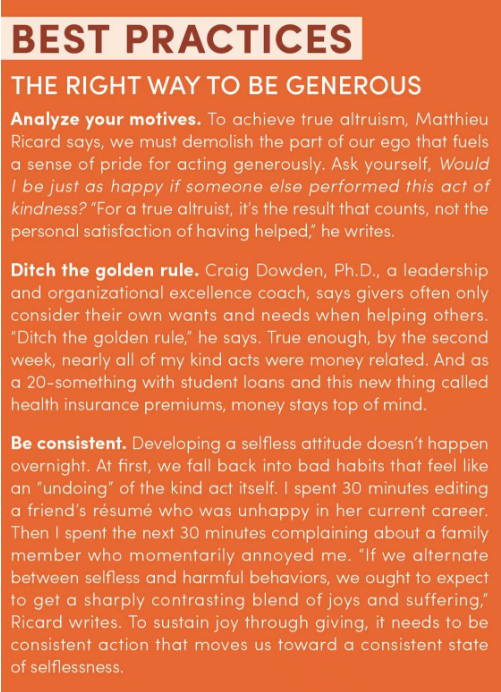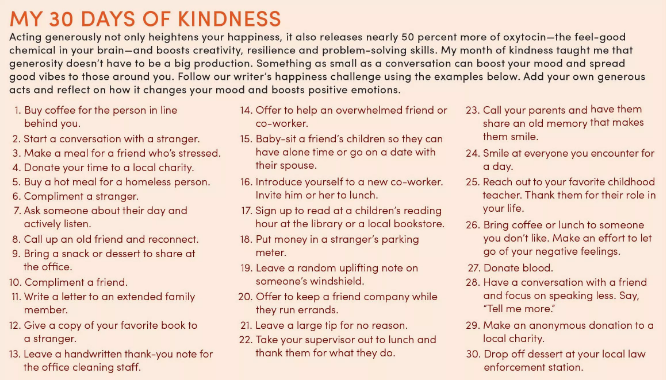How 30 Days of Kindness Made Me a Better Person

Reposted with permission from SUCCESS magazine
I don’t know his name, but his messy, shoulder-length hair hides a pair of hauntingly blue eyes. It’s a warm September day in New York, but he’s sitting under a mountain of ragged bits of clothing, towels and blankets. In one hand, he loosely holds a piece of string attached to the neck of a small, mangy-looking dog lying next to him. In the other hand, he clutches a nearly empty bottle of cheap vodka. His bright eyes briefly glance at me without recognition or focus. I don’t know what makes me pause.
My initial thought is to give him money, though I just avoided eye contact with the last 10 people, sputtering that I didn’t have any. And my mom’s words come to mind: “He’ll only spend it on drugs or alcohol.” So I turn to the closest Nathan’s stand and buy him a hot dog, chips and soda.
When I approach him, I feel awkward, my donation insignificant. As if I’m offering a glass of water to a man trapped in a burning building. Is he more of a ketchup or mustard guy? The absurd thought turns my face hot. What comfort will a nutritionally deficient meal with a side of dehydration be to a man who sleeps on cement and spends a life generally invisible to the world?
But when he sees my outstretched hands, he smiles, dropping the bottle and leash to accept the meal with shaky fingers. We don’t exchange any words, but his smile lingers with me.
Can random acts of kindness actually increase and sustain happiness?
It’s only the sixth day of my month-long challenge to find the joy in making someone’s day every day, and up until now, I had felt like a failure. It wasn’t for lack of trying, but rather questioning whether seemingly small gestures were actually accomplishing my goal. Can I really find joy by giving to those around me? Can random acts of kindness actually increase and sustain happiness?
Turns out they can, but there are exceptions. To find lasting happiness through generosity requires a suppression of our ego, an analysis of our motives and a reflection on how these acts alter our perception of the world.
How Generosity Benefits Us
As children, our parents tell us to make up for misbehaving by doing something nice for someone. As adults, we help friends move into a new house; we bring hot meals to new mothers; we might even donate time or money to local charities a few times a year. After all, it’s naturally uncomfortable to see a friend (or stranger) suffering or in need. Call it karma or mojo, but these acts are generally reciprocated. We receive tax breaks, returned meals and favors, thank-you notes. Tit for tat.
But what about pure, altruistic generosity, without the expectation of receiving something in return? Some researchers argue this type of generosity doesn’t exist. But I set out to see whether I could learn to give without the promise of getting. I made lists of various kind acts and placed reminders on my bathroom mirror, my work computer, my car dashboard: Make someone’s day today!
My first act of kindness was buying coffee for the woman behind me in the drive-thru lane at Starbucks. In fact, my first few acts were buying something for someone—lunch for an old friend, a copy of my favorite book to a stranger—but they didn’t make me feel much of anything. The recipients were grateful, but was I really making their day, and was that really boosting my happiness?
At the end of each day, I reflected how being kind made me feel. I dug for tangible proof of my growth. Some days felt more significant: buying cough syrup for the two coughing boys in pajamas at the pharmacy, for example. Their father, who had dark circles under his eyes, rubbed the bridge of his nose as his credit card was declined a second time. I couldn’t tell whether he was more embarrassed or grateful, but I like to think he slept a little easier that night, and I left the pharmacy feeling pretty good.

Countless studies tout the physical, mental and social benefits of receiving generosity. But until the 1980s, the effects on the giver were relatively unknown. Sonja Lyubomirsky, Ph.D., a psychology professor at UC Riverside and a leading happiness researcher, conducted a study in 2004 to determine whether committing five random acts of kindness would increase positive emotions. The short-term study revealed promising results with heightened levels of positive emotions, particularly in the participants who carried out all five acts of kindness on the same day. Spreading the acts over a week, Lyubomirsky theorized, led to a repetitive and often unoriginal pattern that either didn’t change the level of positive emotions or, in some cases, even lowered it.
Admittedly I experienced some form of generosity fatigue around the second week of my challenge. It’s easy to float through the day wrapped up in our own heads, focusing only on what directly impacts us. Consciously searching for new and different ways to improve someone else’s day was more difficult than I had anticipated. We just don’t face that challenge often in society. But then when I did the nice deed, I nearly always felt a boost of happiness afterward. A 2009 study by social psychologist Jorge A. Barraza, Ph.D., and neuroscientist Paul J. Zak, Ph.D., attributes this to a release of oxytocin, the feel-good chemical in the brain.
According to the study, when people feel empathetic, they release 47 percent more oxytocin into their hippocampus, the part of the brain responsible for emotion and memory. The participants felt the urge to act generously—particularly toward strangers. As Matthieu Ricard, Ph.D., a Buddhist monk and best-selling author, writes in Happiness: A Guide to Developing Life’s Most Important Skill: “When we are happy, the feeling of self-importance is diminished and we are more open to others.” Studies show people who have experienced a positive event in the past hour are more likely to help strangers in need. This explains why we help people, even at a cost to ourselves.
In the late ’80s, the term “helper’s high” was used to describe the euphoria feeling associated with volunteering. Beyond happiness, generous people also experienced enhanced creativity, flexibility, resilience and being open to new information. They’re more collaborative at work; they’re able to solve complex problems more easily and they form solid, healthy relationships with others.
Generosity allows us to forget our own self-importance.
As Stephen G. Post, Ph.D., happiness researcher and founder of The Institute for Research on Unlimited Love, writes, “It may be people who live generous lives soon become aware that in the giving of self lies the unsought discovery of self as the old selfish pursuit of happiness is subjectively revealed as futile and short-sighted.” Generosity allows us to forget our own self-importance, even temporarily, and look outward to uplift those around us who, in turn, often uplift those around them.
Shawn Achor, a Harvard-trained researcher and The Happiness Guy at SUCCESS, calls this the ripple effect. Our behavior, he discovered, is literally contagious. “Our habits, attitudes and actions spread through a complicated web of connections to infect those around us,” he writes. That’s why we sync up with our best friends, often finishing each other’s sentences and reading each other’s thoughts. It’s also why one negative attitude can spread like a disease across an office and infect everyone’s mood.
So are happier people more generous, or does generosity make us happier? Rather than thinking of it as a cause-and-effect relationship, consider happiness and generosity as intertwining entities. “Generating and expressing kindness quickly dispels suffering and replaces it with lasting fulfillment,” writes Ricard, the Buddhist monk. “In turn the gradual actualization of genuine happiness allows kindness to develop as the natural reflection of inner joy.” Helping behavior increases positive emotions, which increases our sense of purpose, regulates stress, and improves short- and long-term health. All of that contributes to a heightened level of happiness, causing us to feel more generous, creating a circle of happiness and generosity.
Why We Aren’t Generous All the Time
I failed twice during my month-long challenge. What began as a positive and energizing morning was quickly derailed—a negative social media post, a complaining text, an overwhelmed co-worker. I refocused my thoughts and tried to make this my kind act for the day. What if I can turn this person’s day around? What if I can help him see the positive side of his situation? I listened, nodded with concern, hyper-aware of my facial expressions, eager to exude empathy and understanding. I’m not sure what I exuded, but both of us left feeling worse than before.
What happened? According to Paul Bloom, professor of psychology and cognitive science at Yale University and author of Against Empathy: The Case for Rational Compassion, I had confused empathy with compassion, resulting in empathetic distress and burnout. Empathy requires feeling what others feel, “to experience, as much as you can, the terrible sorrow and pain,” whereas compassion involves concern and a desire to help without the need to mirror someone else’s anguish.
It turns out, you can be too nice. Psychologists Vicki Helgeson and Heidi Fritz created a questionnaire revealing that women are more likely to put others’ needs before their own, often resulting in asymmetrical relationships as well as an increased risk of depression and anxiety. When we experience empathetic burnout, we often shy away from generosity altogether. Feeling taken advantage of, we retreat inward.
Researchers have also theorized that every kind act is ultimately done to benefit ourselves in some way, even subconsciously. This concept, coined “universal egoism,” offers explanations that are easier to accept than true altruism: a desire to help others void of selfish motives. For example, there are multiple situations that can be initially perceived as true altruism but at its core, the kind act is governed by selfish motives. Ben Dean, Ph.D., psychologist and founder of MentorCoach in Maryland, offers three such examples:
- It’s a natural response to feel uncomfortable when we see someone suffering. But rather than help in order to ease their suffering, we help them to ease our own discomfort.
- In an attempt to protect our fragile egos and reputations, we don’t want to be viewed as insensitive, heartless, mean, etc. So we help others even when we might not feel an urge to improve their well-being.
- We perceive there to be some form of personal benefit from the act, either short- or long-term.
The question remains: Is there a truly selfless act of kindness?
The question remains: Is there a truly selfless act of kindness? And does it even matter where our motivations lie? The homeless man in New York still ate a hot meal, and the two little boys at the pharmacy didn’t stay up all night coughing. Isn’t that what matters?

We aren’t consistently generous for a multitude of reasons, but in the traditional corporate setting, the prevailing enemy of generosity is the fear of appearing naïve. (And the possibility of going broke.) After all, isn’t the nice guy the one who finishes last? So we become “Givers” as Adam Grant Ph.D., details in his best-seller Give and Take. In the modern workplace, we are no longer solely evaluated on our work performance, but rather on how we interact as a cohesive unit and how we contribute to the organization as a whole. In fact, Grant’s research reveals this new business landscape paves the way for Givers to succeed and Takers to be left behind. By helping others, we help ourselves.
The important thing to remember is that Givers—especially those predisposed to putting others’ needs before their own—need to know their boundaries. Grant says it begins with distinguishing generosity from its three other attributes: timidity, availability and empathy.
At the risk of sounding cliché, my month of generosity did make me happier. Something about waking up and consciously planning to act selflessly lightened my step and made the morning drag easier to bear. Something about a stranger flashing a smile (albeit a confused one) as I handed them a dog-eared copy of my favorite memoir gave me an energy boost that a triple-shot latte never could.
For a precious hour or so every day, the fear, anxiety, stress and doubt of daily life didn’t plague my thoughts. I briefly forgot about myself, and it was intoxicating. Friends responded to my seemingly arbitrary good mood with confused laughs. When did being happy without reason become a cause for concern? I wondered.
Maybe my heart was in the right place when I gave the blue-eyed man a hot meal. But maybe my ego was directing my actions that night in the pharmacy checkout lane. And maybe I avoided generosity toward my close friends and co-workers because it was more difficult. Buying coffee for a stranger is easy, detached and allows for a clean exit. Gently pushing a friend to divulge her source of anxiety after she says “I’m fine” is not. After all, altruism and honest self-reflection take time and practice.
Thirty days of generosity didn’t make me a different person, but I do feel different. I don’t actively look for ways to be generous, but I notice the opportunities anyway. Like the sticky note residue on my bathroom mirror, I can see gentle impressions of my growth where I least expect it: during rush hour, when I give the benefit of the doubt to the woman cutting into my lane; after a long day of work, when I make time for the struggling friend who needs to talk; and, most important, in the moments when I forget myself and realize the joy to be found in caring for the people around me.
_____________
Cecilia Meis is the integrated content editor for SUCCESS magazine and SUCCESS.com. She recently earned a bachelor’s degree from the Missouri School of Journalism. A Kansas City native, Cecilia enjoys sand volleyball, new stationery and a heaping plate of burnt ends.
This essay was featured in the Nov. 25th edition of The Sunday Paper, Maria Shriver’s free weekly newsletter for people with passion and purpose. To get inspiring and informative content like this piece delivered straight to your inbox each Sunday morning, click here to subscribe.
READ MORE STORIES THAT MOVE HUMANITY FORWARD
READ MORE STORIES THAT MOVE HUMANITY FORWARD
SIGN UP FOR MARIA’S SUNDAY PAPER

